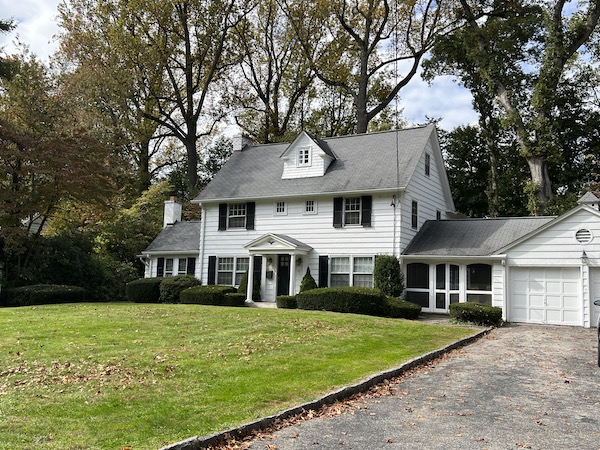NYS Supreme Court Upholds Scarsdale's Historic Preservation Law to Save 27 Woods Lane
- Wednesday, 23 April 2025 12:14
- Last Updated: Wednesday, 23 April 2025 12:23
- Published: Wednesday, 23 April 2025 12:14
- Joanne Wallenstein
- Hits: 4895
 The Village of Scarsdale scored a victory in the NYS Supreme Court County of Westchester when the court upheld the Village’s decision to bar the demolition of a historic Colonial Revival style home at 27 Woods Lane in Edgewood.
The Village of Scarsdale scored a victory in the NYS Supreme Court County of Westchester when the court upheld the Village’s decision to bar the demolition of a historic Colonial Revival style home at 27 Woods Lane in Edgewood.
In the fall of 2023, when neighbors learned of a plan by developers to raze the house, subdivide the property and build two in its place, they launched an impressive campaign to save it. The house is one of the original homes in the development and is set back on a sweeping lawn surrounded by tall oak and tulip trees. Unlike many Scarsdale neighborhoods, this one has been preserved and the home at 27 Woods Lane sits in the center of a picturesque subdivision.
Architectural historian Andrew Dolkart found that the home, “contributes to the most important issue in the history and development of Scarsdale, the major suburbanization of the village which largely occurred in the second and third decades of the twentieth century….. there would be no village of Scarsdale as we know it, without this important development brought about by changing cultural and economic conditions in urban America.”
The Committee for Historic Preservation voted unanimously to preserve it, and the applicants then appealed the decision to the Scarsdale Board of Trustees, who concurred.
The Scarsdale Board of Trustees decision says, “ The Board of Trustees hereby finds, as set forth herein, that there is substantial evidence in the record to establish that the home located at 27 Woods Lane meets the criteria for preservation set forth in Village Code § 182-5, specifically Village Code §§ 182-5(A)(1) and (4), and thus, the Board or Trustees denies the issuance of a Certificate of Appropriateness to demolish the home located at 27 Woods Lane, Scarsdale, New York, being known and designated on the tax map of the Village of Scarsdale as Section 12; Block 08; Lot 12; You can read their decision here:
However, the applicants then appealed the decision to the NYS Supreme Court. Representing the applicants, attorneys from Cuddy and Feder argued that the respondents' decision, "was not supported by substantial record evidence, is arbitrary, capricious and constitutes an abuse of discretion ... the Historic Preservation Law (HPL) is unconstitutional on its face and as process..." applied to Petitioner as it deprives property owners in Scarsdale of due process ... " and that the Respondents violated open meetings law.”
Here are some excerpts from the decision:
To the charge that the law was arbitrary or capricious, the Supreme Court found that “a court cannot overturn an agency determination simply because it believes that a different, perhaps better outcome could have resulted.” And “Even when the presentation of evidence boils down to a battle of experts, a determination cannot be overturned simply because the experts disagree or one party disagrees with the outcome; an agency has the discretion to evaluate the evidence and testimony and determine which expert it finds to be more credible.”
On the charge that the historic preservation law is unconstitutional, the court found, “Because we are dealing with words we can never expect objective precision because there will always be room for discretionary interpretation, but using the plain meanings of the words coupled with how they are to be applied though canons of statutory construction provide sufficient guidelines for how the words are to be used; "the fact that different parties may disagree on the significance of certain statutory language does not indicate that the statue is unconstitutionally vague. “
And last, to the charge that the meeting was not held in public, the court found that the Board of Trustees was acting as a “quasi-judicial do novo appellate authority over the CHP, not in their legislative capacity so there was no requirement that the meeting be held in public.
Neighbors cheered the decision and wondered what’s next for the house, which now appears to be for rent.
The decision was a favorable one for preservationists as it upholds Scarsdale’s Village Preservation Code and should act as a deterrent in the future for others who seek to raze historic homes.
Speaking at the Village Board meeting on April 22, Village Historian Jordan Copeland thanked the Board of Trustees. He said, “The court commented how substantive the record was. There was nothing to attack. This attack on our historic preservation law was rejected.”
















